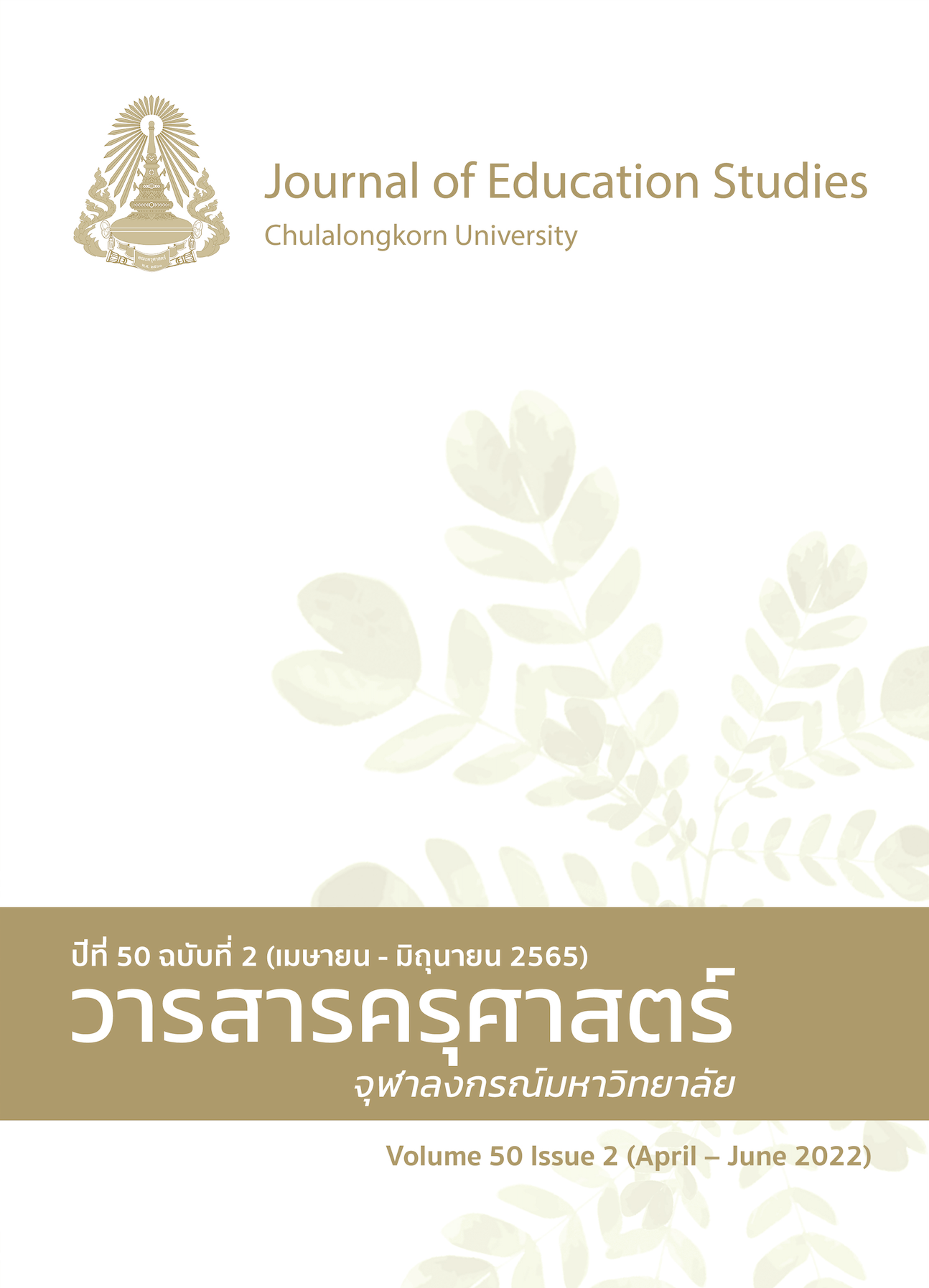A Comparative of Knowledge Absorption Capacity of School Administrators as Perceived by Teachers in School under the Bangkok Secondary Educational Service Area Office
DOI:
https://doi.org/10.14456/educu.2022.14Keywords:
knowledge absorption, knowledge absorption capacity, school administratorsAbstract
The purpose of this research was to study and compare the knowledge absorption capacity of school administrators as perceived by teachers in schools under the Bangkok Secondary Educational Service Area Office. The study employed a survey research design with samples consisting of 305 teachers in the academic year 2021. The samples were categorized by using the Cohen’ sample sizes which were selected by stratified random sampling. The instrument was a questionnaire with a reliability of 0.989. Mean, standard deviation, t-test, One-way ANOVA, and Scheffé’s multiple comparison method were used to analyze the data. The findings were as follows: 1) the results of knowledge absorption capacity of school administrators was at high level, considering each dimension of the opinion, all of them were also at high level; and 2) teachers at different levels of education and academic titles had different perceptions toward knowledge absorption capacity of school administrators statistically at the significant level of .05. By levels of education, teachers with a graduate degree or above had higher perception levels than those with a bachelor’s degree. By academic titles, senior professional teachers (K 3 teachers) had higher perception level than practitioner teachers (K 1 teachers) and the professional teachers (K 2 teachers) had higher perception level than practitioner teachers (K 1 teachers). There was no significant differences found among teachers in schools of different sizes and original affiliations.
References
ภาษาไทย
กนกชล ธนบดีเลิศเมธา. (2561). ปัจจัยที่ส่งผลต่อประสิทธิภาพในการถ่ายโอนเทคโนโลยีจากบริษัทแม่ในต่างประเทศ
กรณีศึกษา บริษัทรถยนต์แห่งหนึ่งในประเทศไทย [วิทยานิพนธ์วิทยาศาสตรมหาบัณฑิต, มหาวิทยาลัยธรรมศาสตร์].http://ethesisarchive.library.tu.ac.th/thesis/2018/TU_2018_6023032086_9283_10237.pdf
กรรณิกา เชาว์วัฒนกุล. (2559). ความสามารถในการดูดซับความรู้ : อิทธิพลจากภาวะผู้นำเปลี่ยนสภาพกลไกจาก
ช่องทางการรั่วซึมความรู้ และผลกระทบต่อนวัตกรรมของมหาวิทยาลัยบรรษัทไทย. วารสารพยาบาลทหารบก,
(3), 90-98.
จิราพรรณ แสงมณี. (2559). ประสิทธิภาพการจัดการความรู้ตามทัศนะของผู้บริหารและครูโรงเรียนเอกชนในจังหวัด
นครศรีธรรมราช. วารสารเทคโนโลยีภาคใต้, 9(2), 11-18.
พงษ์พัฒน์ วอทอง. (2563). การจัดการความรู้ส่วนบุคคลที่ส่งผลต่อสมรรถนะการจัดการเรียนรู้ของครูสังกัดสำนักงานเขต
พื้นที่การศึกษามัธยมศึกษาเขต 30 [วิทยานิพนธ์ศึกษาศาสตรมหาบัณฑิต, มหาวิทยาลัยขอนแก่น].
รัฐธรรมนูญแห่งราชอาณาจักรไทย. (2560). หมวด 5 หน้าที่ของรัฐ. http://www.ratchakitcha.soc.go.th/DATA/PDF/
/A/040/1.PDF.
เสรี ทองคำ. (2556). การจัดการความรู้และแนวทางการพัฒนาการจัดการความรู้ สำหรับสถานศึกษาขั้นพื้นฐาน สังกัด
สำนักงานเขตพื้นที่การศึกษาประถมศึกษาชลบุรี เขต 2. วารสารศึกษาศาสตร์, 24(3), 86-100.
สุชาดา หวังดี. (2560). การจัดการความรู้ของครูในโรงเรียนกลุ่มศูนย์ภัทรบูรพา สังกัดสำนักงานเขตพื้นที่การศึกษา
ประถมศึกษาตราด [วิทยานิพนธ์ศึกษาศาสตรมหาบัณฑิต, มหาวิทยาลัยบูรพา]. https://shorturl.asia/WbOry
สำนักงานคณะกรรมการพัฒนาการเศรษฐกิจและสังคมแห่งชาติ สำนักนายกรัฐมนตรี. (2559). แผนพัฒนาเศรษฐกิจและสังคม
แห่งชาติ ฉบับที่สิบสอง พ.ศ. 2560 - 2564. https://www.nesdc.go.th.
อิทธิพัทธ์ สุวทันพรกูล. (2561). การวิจัยทางการศึกษาแนวคิดและการประยุกต์ใช้ Educational research concepts
and applications. โรงพิมพ์แห่งจุฬาลงกรณ์มหาวิทยาลัย.
ภาษาอังกฤษ
Anderson, R. (2008). Implications of the information and knowledge society for education. In J. Voogt, &
G. Knezek, (Eds.), International handbook of information technology inprimary and secondary
education (pp. 5-22). Springer.
Cohen, L., Lawrence, M., & Keith, M. (2011). Research methods in education (7th ed). Routledge.
Cohen, W. M., & Levinthal, D. A. (1990). Absorptive capacity: A new perspective on learning and
innovation. Administrative Science Quarterly.
Kostopoulos, K., Papalexandris, A., Papachroni, M., & Ioannou, G. (2011). Absorptive capacity, innovation,
and financial performance. Journal of Business Research, 11(Suppl. 64), 1335-1343. https://doi.org/10.1016/j.jbusres.2010.12.005
Lichtenthaler, U. (2009). Absorptive capacity, environmental turbulence, and the complementarily of
organizational learning processes. Otto Beisheim School of Management.
Miroshnychenko, I., Strobl, A., Matzler, K., & Massisa, A. D. (2021). Absorptive capacity, strategic flexibility,
and business model innovation: Empirical evidence from Italian SMEs. Journal of Business
Research, 21(Suppl. 130), 670-682. https://www.research.lancs.ac.uk/portal/en/publications/
absorptive-capacity-strategic-flexibility-and-business-model-innovation(31de6a0d-eb6b-48dc-a4cb d30f8d348d47).html
Muller, J. M., Buliga, O., & Voigt, K. I. (2020). The role of absorptive capacity and innovation strategy in the
design of industry 4.0 business models - A comparison between SMEs and large enterprises.
European Management Journal, 20(Suppl. 39), 333-343. https://doi.org/10.1016/j.emj.2020.01.002.
Noblet, J. P., Simon, E. & Parent, R. (2011). Absorptive capacity: a proposed operationalization. Knowledge
Management Research & Practice, 11(Suppl.9), 367-377. www.palgrave-journals.com/kmrp/.
Schweisfurth, T. G., & Raasch, C. (2018). Absorptive capacity for need knowledge: Antecedents and effects
for employee innovativeness. Research Policy, 18(Suppl. 47), 687-699.
Zahra, S. A., & George, G. (2002). Absorbtive capacity: A review, reconceptualization, and extension. The
Academy of Management, 02(Suppl. 27), 185-203. https://www.jstor.org/stable/4134351
Downloads
Published
How to Cite
Issue
Section
License

This work is licensed under a Creative Commons Attribution-NonCommercial-NoDerivatives 4.0 International License.




